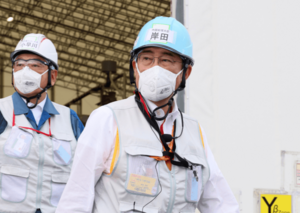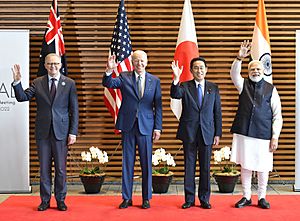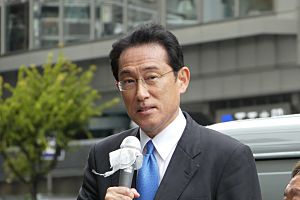Fumio Kishida facts for kids
Quick facts for kids
Fumio Kishida
|
|||||||||||||||||||||||||||||||||||||||||||||||||||||||||||||||||||||||||||||||||||
|---|---|---|---|---|---|---|---|---|---|---|---|---|---|---|---|---|---|---|---|---|---|---|---|---|---|---|---|---|---|---|---|---|---|---|---|---|---|---|---|---|---|---|---|---|---|---|---|---|---|---|---|---|---|---|---|---|---|---|---|---|---|---|---|---|---|---|---|---|---|---|---|---|---|---|---|---|---|---|---|---|---|---|---|
|
岸田 文雄
|
|||||||||||||||||||||||||||||||||||||||||||||||||||||||||||||||||||||||||||||||||||
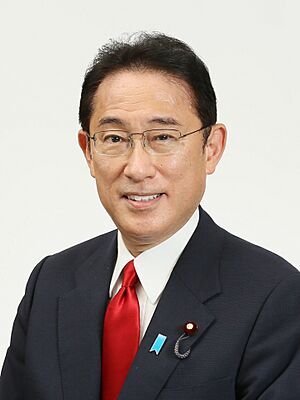
Official portrait, 2021
|
|||||||||||||||||||||||||||||||||||||||||||||||||||||||||||||||||||||||||||||||||||
| Prime Minister of Japan | |||||||||||||||||||||||||||||||||||||||||||||||||||||||||||||||||||||||||||||||||||
| In office 4 October 2021 – 1 October 2024 |
|||||||||||||||||||||||||||||||||||||||||||||||||||||||||||||||||||||||||||||||||||
| Monarch | Naruhito | ||||||||||||||||||||||||||||||||||||||||||||||||||||||||||||||||||||||||||||||||||
| Preceded by | Yoshihide Suga | ||||||||||||||||||||||||||||||||||||||||||||||||||||||||||||||||||||||||||||||||||
| Succeeded by | Shigeru Ishiba | ||||||||||||||||||||||||||||||||||||||||||||||||||||||||||||||||||||||||||||||||||
| President of the Liberal Democratic Party | |||||||||||||||||||||||||||||||||||||||||||||||||||||||||||||||||||||||||||||||||||
| In office 29 September 2021 – 27 September 2024 |
|||||||||||||||||||||||||||||||||||||||||||||||||||||||||||||||||||||||||||||||||||
| Vice President | Tarō Asō | ||||||||||||||||||||||||||||||||||||||||||||||||||||||||||||||||||||||||||||||||||
| Secretary-General |
|
||||||||||||||||||||||||||||||||||||||||||||||||||||||||||||||||||||||||||||||||||
| Preceded by | Yoshihide Suga | ||||||||||||||||||||||||||||||||||||||||||||||||||||||||||||||||||||||||||||||||||
| Succeeded by | Shigeru Ishiba | ||||||||||||||||||||||||||||||||||||||||||||||||||||||||||||||||||||||||||||||||||
|
|||||||||||||||||||||||||||||||||||||||||||||||||||||||||||||||||||||||||||||||||||
|
|||||||||||||||||||||||||||||||||||||||||||||||||||||||||||||||||||||||||||||||||||
| Assumed office 20 October 1996 |
|||||||||||||||||||||||||||||||||||||||||||||||||||||||||||||||||||||||||||||||||||
| Preceded by | Constituency established | ||||||||||||||||||||||||||||||||||||||||||||||||||||||||||||||||||||||||||||||||||
| Majority | 117,800 (71.1%) | ||||||||||||||||||||||||||||||||||||||||||||||||||||||||||||||||||||||||||||||||||
| In office 18 July 1993 – 27 September 1996 |
|||||||||||||||||||||||||||||||||||||||||||||||||||||||||||||||||||||||||||||||||||
| Constituency |
|
||||||||||||||||||||||||||||||||||||||||||||||||||||||||||||||||||||||||||||||||||
| Personal details | |||||||||||||||||||||||||||||||||||||||||||||||||||||||||||||||||||||||||||||||||||
| Born | 29 July 1957 Shibuya, Tokyo, Japan |
||||||||||||||||||||||||||||||||||||||||||||||||||||||||||||||||||||||||||||||||||
| Political party | Liberal Democratic | ||||||||||||||||||||||||||||||||||||||||||||||||||||||||||||||||||||||||||||||||||
| Spouse |
Yuko Wada
(m. 1988) |
||||||||||||||||||||||||||||||||||||||||||||||||||||||||||||||||||||||||||||||||||
| Children | 3 | ||||||||||||||||||||||||||||||||||||||||||||||||||||||||||||||||||||||||||||||||||
| Education | Kaisei Academy | ||||||||||||||||||||||||||||||||||||||||||||||||||||||||||||||||||||||||||||||||||
| Alma mater | Waseda University (LLB) | ||||||||||||||||||||||||||||||||||||||||||||||||||||||||||||||||||||||||||||||||||
| Signature | |||||||||||||||||||||||||||||||||||||||||||||||||||||||||||||||||||||||||||||||||||
| Japanese name | |||||||||||||||||||||||||||||||||||||||||||||||||||||||||||||||||||||||||||||||||||
| Kanji | 岸田 文雄 | ||||||||||||||||||||||||||||||||||||||||||||||||||||||||||||||||||||||||||||||||||
| Revised Hepburn | Kishida Fumio | ||||||||||||||||||||||||||||||||||||||||||||||||||||||||||||||||||||||||||||||||||
Fumio Kishida (born 29 July 1957) is a Japanese politician. He served as the 64th prime minister of Japan and leader of the Liberal Democratic Party (LDP) from 2021 to 2024. He is a member of Japan's House of Representatives. Before becoming prime minister, he was the Minister for Foreign Affairs from 2012 to 2017. He also briefly served as acting Minister of Defense in 2017.
On 14 August 2024, Kishida announced he would step down as LDP party leader. This meant he would not seek re-election in September. Shigeru Ishiba replaced him.
Contents
Early Life and Education
Fumio Kishida was born in Shibuya, Tokyo, on 29 July 1957. He comes from a family with a history in politics. His father, Fumitake Kishida, worked for the government. The Kishida family was from Hiroshima, and they visited there every summer. Many family members had died in the atomic bombing of Hiroshima. Fumio grew up hearing stories from survivors. Both his father and grandfather were members of the House of Representatives.
Kishida attended elementary school in New York City because his father had a job in the U.S. at that time. He also went to Kōjimachi Elementary School and Kōjimachi Junior High School in Japan. He graduated from Kaisei Academy, where he played baseball.
After being turned down by the University of Tokyo several times, Kishida studied law at Waseda University. He graduated in 1982.
Political Journey
After working at a bank, Kishida started his political career. He was elected to the House of Representatives in 1993 as a member of the LDP. From 2007 to 2008, he served as the Minister of Okinawa Affairs. He also held roles as state minister for consumer affairs, food safety, and science and technology.
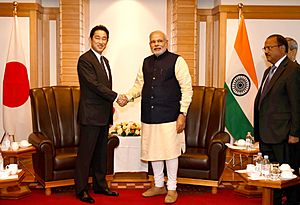
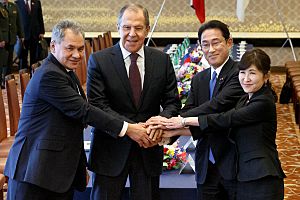
In October 2012, Kishida took control of the Kōchikai faction, an old group within the LDP. He became the Minister for Foreign Affairs in 2012. He held this position for five years, making him the longest-serving Foreign Affairs Minister in Japan's history. In 2017, he left this role to lead the LDP's Policy Research Council.
Becoming Prime Minister (2021–2024)
In September 2021, the previous prime minister, Yoshihide Suga, announced he would resign. This led to a new election for the leader of the LDP. Fumio Kishida and Taro Kono were the main candidates.
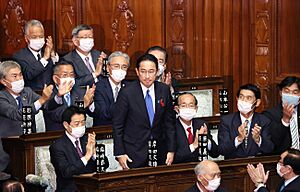
On 29 September 2021, Kishida won the election to become the leader of the ruling Liberal Democratic Party. He received 257 votes. This meant he would become Japan's next prime minister.
Key Domestic Policies
As prime minister, Kishida focused on several important issues within Japan.
- Defense Spending: In December 2022, Kishida asked his government to increase spending on national security. The goal was to raise the military budget from about $40 billion in 2022 to $66 billion by 2027. This would increase total defense spending by 65% over five years.
- Child Care Support: Kishida made child care a top priority in 2023. He stressed the importance of addressing Japan's declining birth rates. His administration planned to increase financial benefits for parents. He announced a goal to double the budget for child-related programs by June 2023.
- COVID-19 Measures: On 13 March 2023, Kishida's government ended the request for citizens to wear face masks in public. This policy had been in place for three years to fight the COVID-19 pandemic in Japan. In April, the government announced that COVID-19 would be classified like a "seasonal flu" starting 8 May.
- Economy and Wages: Kishida appointed Kazuo Ueda as the new Governor of the Bank of Japan in April 2023. Ueda planned to continue easy money policies. Kishida also stated his goal to raise the hourly minimum wage in Japan to about ¥1,500 ($10.29) by 2030.
Fukushima Water Release
In April 2021, the government before Kishida's announced a plan to release treated water from the Fukushima Daiichi Nuclear Power Plant into the ocean. This process was expected to take 30 years. Kishida's government confirmed they would continue with this plan in August 2023.
Before the release, Kishida's government worked with the International Atomic Energy Agency (IAEA). The IAEA confirmed the safety of the operation. They stated that the levels of tritium (a radioactive substance) in the water were much lower than safety standards. The dumping began on 24 August 2023, with no reported problems.
- Reactions to the Release: The decision received mixed reactions. Some groups in Japan, like fisheries, were against the plan. China strongly opposed the dumping and banned all Japanese fish products. China was criticized for this ban, as it had released nuclear waste water with higher tritium levels in the past.
- International Support: The United States supported Japan's decision. The American ambassador even visited Fukushima and ate seafood to show it was safe. In South Korea, there were protests, but the South Korean government did not oppose the plan. President Yoon also ate Fukushima seafood to show it was safe.
- Safety Checks: The Environment Ministry conducted many tests on the water and fish. They confirmed that tritium levels remained low. Kishida promised to support local fisheries financially. On 30 August, Kishida and three ministers publicly ate fish sashimi from Fukushima. He called it "safe and delicious" to ease public fears.
Foreign Relations
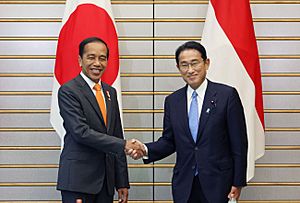
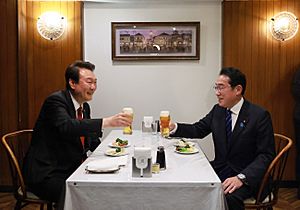
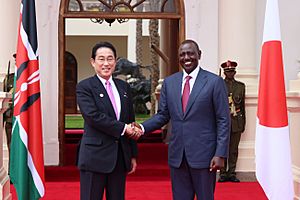
Kishida worked to strengthen Japan's relationships with other countries. He visited nations like India and Australia, which are part of the Quadrilateral Security Dialogue (Quad). He also visited countries in Europe, Canada, and the United States. Japan hosted the 49th G7 summit in May 2023.
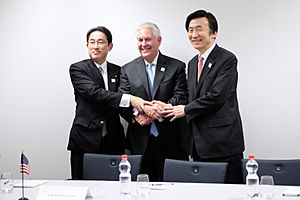
Kishida attended NATO summits in Spain (2022) and Lithuania (2023). He supported Bangladesh's efforts to help Rohingya refugees return to Myanmar.
Resignation from Leadership
On 14 August 2024, Fumio Kishida announced he would not seek another term as president of the LDP. This decision effectively ended his time as prime minister. He stated that he wanted the party to have an "open contest" to show that the LDP was changing.
Political Views
Nuclear Policy
Kishida supports using nuclear power technology. He believes it should be seen as a clean energy option. He also called for a large university fund to boost science and renewable energy.
As a representative from Hiroshima, Kishida has always promoted nuclear non-proliferation and disarmament. He believes Japan should work to prevent the spread of nuclear weapons. He rejected the idea of Japan hosting U.S. nuclear weapons. He said this would go against Japan's Three Non-Nuclear Principles, which state that Japan will not possess, produce, or allow nuclear weapons on its territory.
Personal Life
In 1988, Fumio Kishida married Yuko Kishida in an arranged marriage. Yuko is the daughter of a real estate investor. They have three sons.
Kishida is a fan of the manga series Demon Slayer: Kimetsu no Yaiba. He has promised to support the Japanese animation industry. He also enjoys watching the Hiroshima Toyo Carp baseball team.
In May 2023, Kishida dismissed his eldest son, Shotaro Kishida, from his role as policy secretary. This was due to misuse of government resources.
Honours
 Netherlands: Knight Grand Cross of the Order of Orange-Nassau (29 October 2014)
Netherlands: Knight Grand Cross of the Order of Orange-Nassau (29 October 2014) Spain: Knight Grand Cross of the Order of Isabella the Catholic (31 March 2017)
Spain: Knight Grand Cross of the Order of Isabella the Catholic (31 March 2017)
Images for kids
See also
 In Spanish: Fumio Kishida para niños
In Spanish: Fumio Kishida para niños
 | Chris Smalls |
 | Fred Hampton |
 | Ralph Abernathy |


